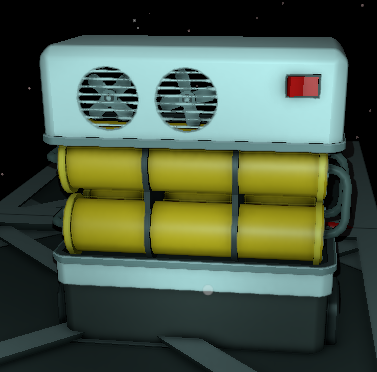Difference between revisions of "Electrolyzer"
From Unofficial Stationeers Wiki
m (Updated power use and usage to reflect current game version) |
m (add requires_frames to box template) |
||
| (7 intermediate revisions by 5 users not shown) | |||
| Line 5: | Line 5: | ||
| placed_with_item = [[Kit (Atmospherics)]] | | placed_with_item = [[Kit (Atmospherics)]] | ||
| placed_on_grid = Small Grid | | placed_on_grid = Small Grid | ||
| + | | requires_frames = Yes | ||
| decon_with_tool1 = [[Hand Drill]] | | decon_with_tool1 = [[Hand Drill]] | ||
| item_rec1 = [[Kit (Atmospherics)]] | | item_rec1 = [[Kit (Atmospherics)]] | ||
}} | }} | ||
| + | |||
| + | =Description= | ||
Storing water got you down? At the expense of power, you can turn that excess water into a bunch of heat and a somewhat risky mix of Oxygen and Volatiles using the new Electrolysis Machine. Available on the existing Atmospherics kit with Air Conditioners and Filtration machines. | Storing water got you down? At the expense of power, you can turn that excess water into a bunch of heat and a somewhat risky mix of Oxygen and Volatiles using the new Electrolysis Machine. Available on the existing Atmospherics kit with Air Conditioners and Filtration machines. | ||
| − | + | =Usage= | |
# Select [[Kit (Atmospherics)]] for placement, and change the variant to Electrolyzer. | # Select [[Kit (Atmospherics)]] for placement, and change the variant to Electrolyzer. | ||
# Connect liquid pipe to the '''Input''' liquid connection to transfer water into the machine. | # Connect liquid pipe to the '''Input''' liquid connection to transfer water into the machine. | ||
# Connect gas pipe to the '''Output''' gas connection to remove the created H2 and O2. | # Connect gas pipe to the '''Output''' gas connection to remove the created H2 and O2. | ||
| − | + | =Notes= | |
* H2 and O2 are produced mixed together in a single gas pipe, creating a dangerous fuel mixture that can be directly used in a furnace. | * H2 and O2 are produced mixed together in a single gas pipe, creating a dangerous fuel mixture that can be directly used in a furnace. | ||
| − | * If the temperature inside the Electrolyzer reaches | + | * Assuming in vacuum conditions, the Electrolyzer always outputs [[Oxyhydrogen]] (ie fuel) at 20 Celcius. https://en.wikipedia.org/wiki/High-temperature_electrolysis |
| + | * The conversion rate is 1 mol [[Water|H2O]] produces 1 mol [[Oxygen|O2]] and 2 mols [[Volatiles|H2]]. | ||
| + | * If the temperature inside the Electrolyzer reaches 300C, autoignition occurs, creating heat, and converting virtually all O2 and H2 inside the machine into CO2 and X. Keep this in mind on high-temperature worlds. | ||
* If autoignition occurs, it doesn't propagate to the gas pipe connected to the Electrolyzer, so the gas already removed is safe, provided it is insulated from further temperature increases. | * If autoignition occurs, it doesn't propagate to the gas pipe connected to the Electrolyzer, so the gas already removed is safe, provided it is insulated from further temperature increases. | ||
* The Electrolyzer's internal volume is generally separated from the pipe network, and it can release its content only if the machine is turned on. | * The Electrolyzer's internal volume is generally separated from the pipe network, and it can release its content only if the machine is turned on. | ||
Latest revision as of 00:54, 21 January 2026
 | |
| Operation | |
|---|---|
| Power Usage | 3600W |
| Construction | |
| Placed with | Kit (Atmospherics) |
| Placed on | Small Grid |
| Requires Frame | Yes |
| Stage 1 | |
| Deconstruction | |
| Deconstructed with | Hand Drill |
| Item received | Kit (Atmospherics) |
Contents
Description[edit]
Storing water got you down? At the expense of power, you can turn that excess water into a bunch of heat and a somewhat risky mix of Oxygen and Volatiles using the new Electrolysis Machine. Available on the existing Atmospherics kit with Air Conditioners and Filtration machines.
Usage[edit]
- Select Kit (Atmospherics) for placement, and change the variant to Electrolyzer.
- Connect liquid pipe to the Input liquid connection to transfer water into the machine.
- Connect gas pipe to the Output gas connection to remove the created H2 and O2.
Notes[edit]
- H2 and O2 are produced mixed together in a single gas pipe, creating a dangerous fuel mixture that can be directly used in a furnace.
- Assuming in vacuum conditions, the Electrolyzer always outputs Oxyhydrogen (ie fuel) at 20 Celcius. https://en.wikipedia.org/wiki/High-temperature_electrolysis
- The conversion rate is 1 mol H2O produces 1 mol O2 and 2 mols H2.
- If the temperature inside the Electrolyzer reaches 300C, autoignition occurs, creating heat, and converting virtually all O2 and H2 inside the machine into CO2 and X. Keep this in mind on high-temperature worlds.
- If autoignition occurs, it doesn't propagate to the gas pipe connected to the Electrolyzer, so the gas already removed is safe, provided it is insulated from further temperature increases.
- The Electrolyzer's internal volume is generally separated from the pipe network, and it can release its content only if the machine is turned on.
Data Network Properties[edit]
These are all Data Network properties of this device.
Data Parameters[edit]
These are all parameters that can be written with a Logic Writer, Batch Writer, or Integrated Circuit (IC10).
| Parameter Name | Data Type | Description |
|---|---|---|
| Lock | Boolean | Locks the Electrolyzer , when set to 1. Unlocks it, when set to 0. |
| On | Boolean | Turns the Electrolyzer on, when set to 1. Turns it off, when set to 0. |
Data Outputs[edit]
These are all parameters, that can be read with a Logic Reader or a Slot Reader. The outputs are listed in the order a Logic Reader's "VAR" setting cycles through them.
| Output Name | Data Type | Description |
|---|---|---|
| Power | Boolean | Returns whether the Electrolyzer is turned on and receives power. (0 for no, 1 for yes) |
| Error | Boolean | Returns whether the Electrolyzer is flashing an error. (0 for no, 1 for yes) |
| Lock | Boolean | Returns whether the Electrolyzer is locked. (0 for no, 1 for yes) |
| On | Boolean | Returns whether the Electrolyzer is turned on. (0 for no, 1 for yes) |
| RequiredPower | Integer | Returns the current amount of power, required by the Electrolyzer, in Watts. |
